![]()

Hearts of the World (1918)
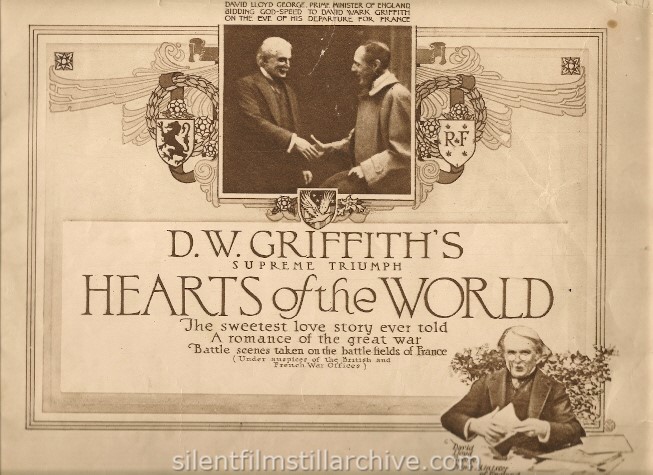
David Lloyd George, Prime Minister of England, Bidding God-Speed to David Wark Griffith on the eve of his departure for France
D. W. GRIFFITH'S
SUPREME TRIUMPH
HEARTS OF THE WORLD
The sweetest love story ever told
A romance of the
great war
Battle scenes taken on the battle-fields of France
(Under the auspices of the British and French War Offices)
David Lloyd George, Prime Minister of England
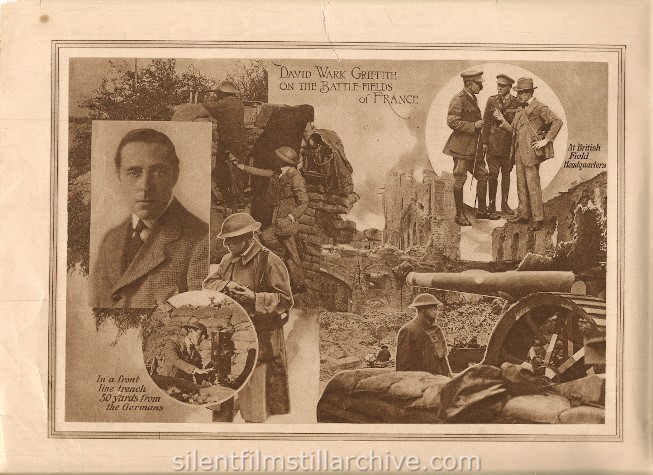
David Wark Griffith on the Battle-fields of France
At British Field Headquarters
In a front line trench 50 yards from
the Germans
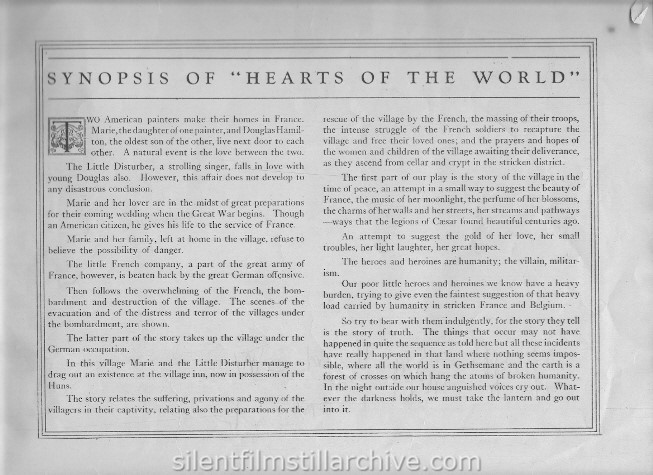
SYNOPSIS OF "HEARTS OF THE WORLD"
TWO American painters make their homes in France. Marie the daughter of one painter, and Douglas Hamilton, the oldest son of the other, live next door to each other. A natural event is the love between the two.
The Little Disturber, a strolling singer, falls in love with young Douglas also. However, this affair does not develop to any disastrous conclusion.
Marie and her lover and in the midst of great preparations for their coming wedding when the Great War begins. Though an American citizen, he gives his life to the service of France.
Marie and her family, left at home in the village, refuse to believe the possibility of danger.
The little French company, a part of the great army of France, however, is beaten back by the great German offensive.
Then follow the overwhelming of the French, the bombardment and destruction of the village. The scenes of the evacuation and of the distress and terror of the villages under the bombardment, are shown.
The latter part of the story takes up the village under the German occupation.
In this village Marie and the Little Disturber manage to drag out an existence at the village inn, now in possession of the Huns.
The story relates the suffering, privations and agony of the villagers in their captivity, relating also the preparations for the resue of the village by the French, the massing of their troops, the intense struggle of the Franch soldiers to recapture the village and free their loved ones; and the prayers and hopes of the women and children of the village awaiting their deliverance, as they ascend from cellar and crypt in the stricken district.
The first part of our play is the story of the village in the time of peace, an attempt in a small way to suggest the beauty of France, the music of her moonlight, the perfume of her blossoms, the charms of her walls and her streets, her streams and pathways -- ways the the legions of Caesar found beautiful centuries ago.
An attempt to suggest the gold of her love, her small troubles, her light laughter, her great hopes.
The heroes and heroines are humanity; the villain, militarism.
Our poor little heroes and heroines we know have a heavy burden, trying to give even the faintest suggestion of that heavy load carried by humanity in stricken France and Belgium.
So try to bear with them indulgently, for the story they tell is the story of truth. The things that occur may not have happened in quite the sequence as told here but all these incidents have really happened in that land where nothing seems impossible, where all the world is in Gethsemane and the earth is a forest of crosses on which hang the atoms of broken humanity. In the night outside our house anguished voices cry out. Whatever the darkness holds, we must take the lantern and go out into it.
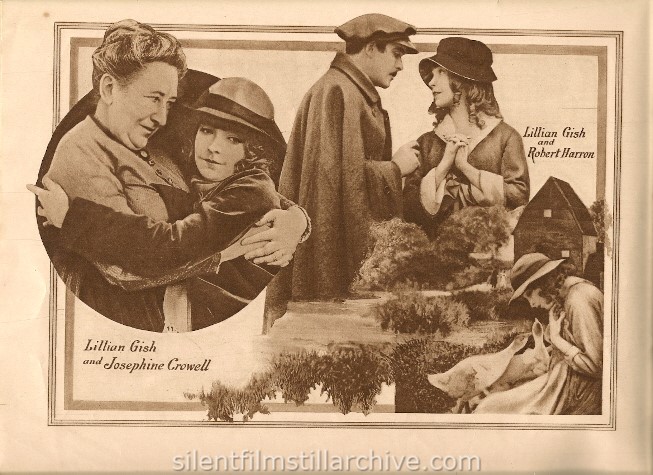
Lillian Gish and Josephine Crowell
Lillian Gish and
Robert Harron
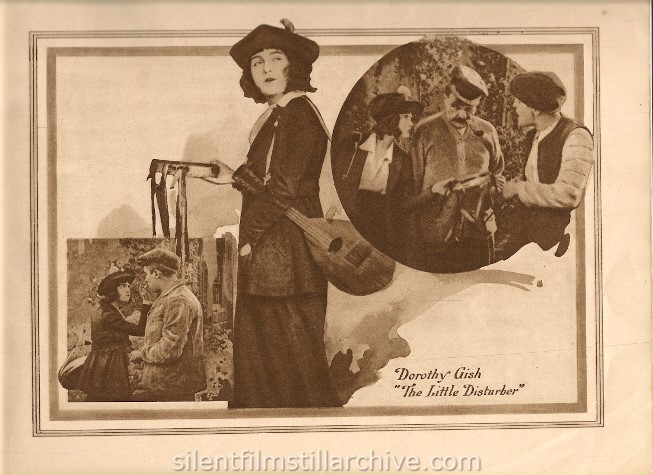
Dorothy Gish
"The Little Disturber"
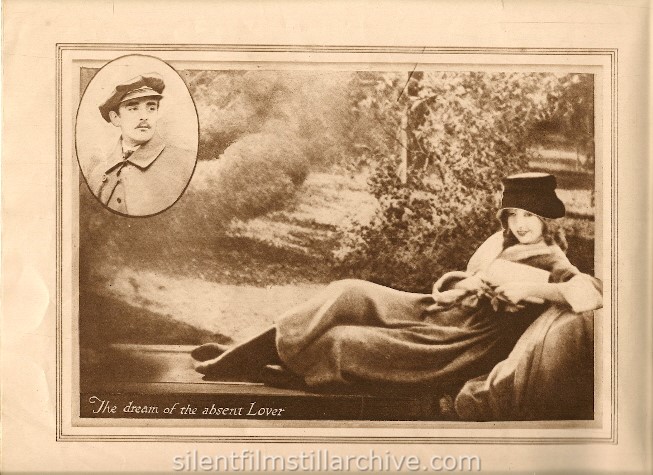
The dream of an absent Lover
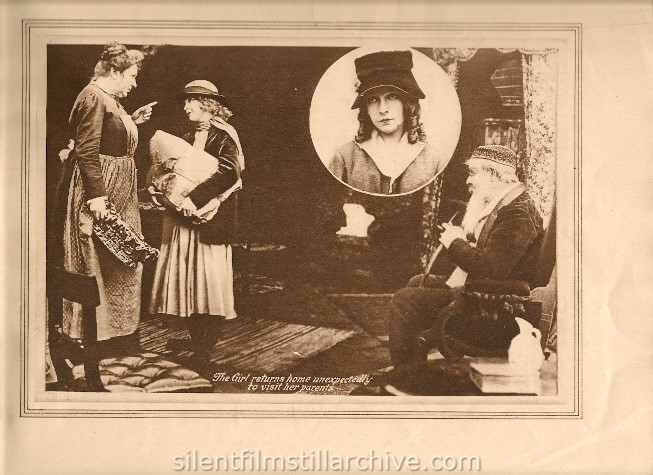
The Girl returns home unexpectedly to visit her parents
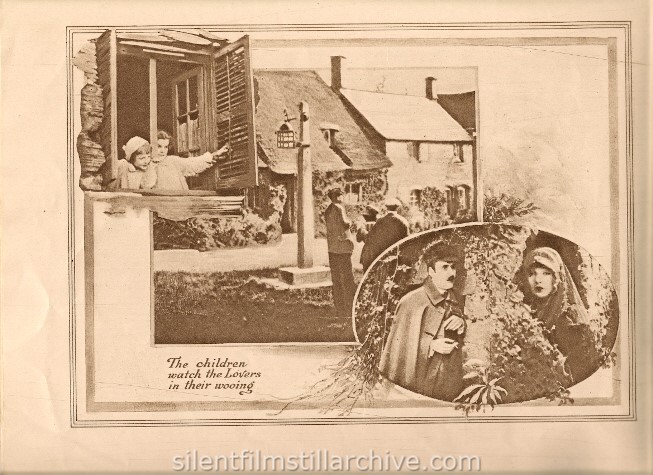
The children watch the Lovers in their wooing
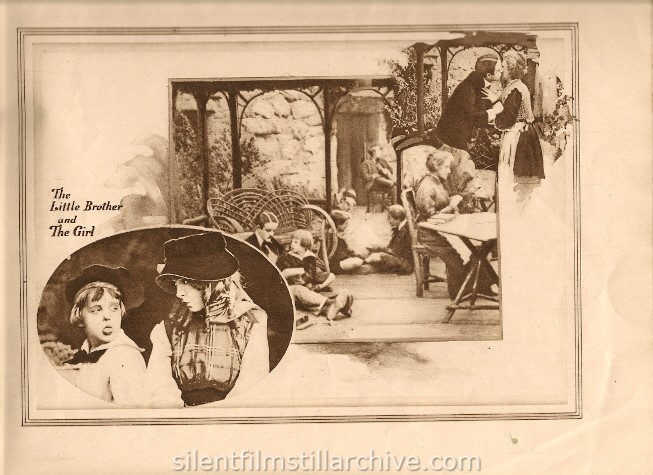
The Little Brother and the Girl
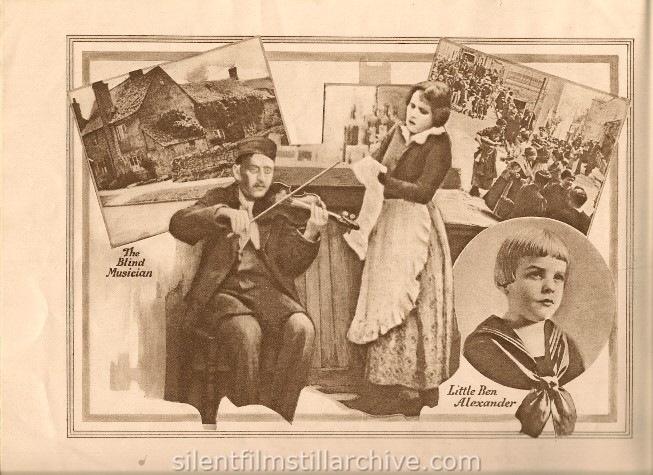
The Blind Musician
Little Ben Alexander
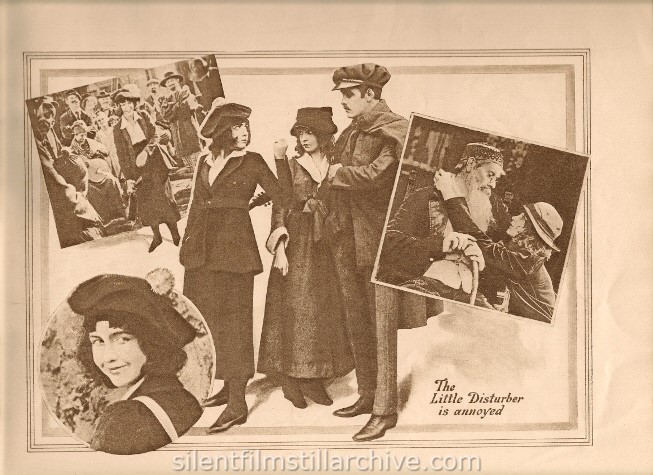
The Little Disturber is annoyed.
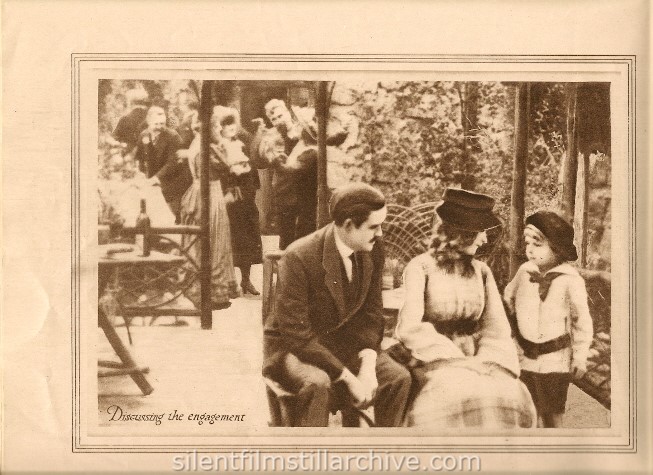
Discussing the engagement
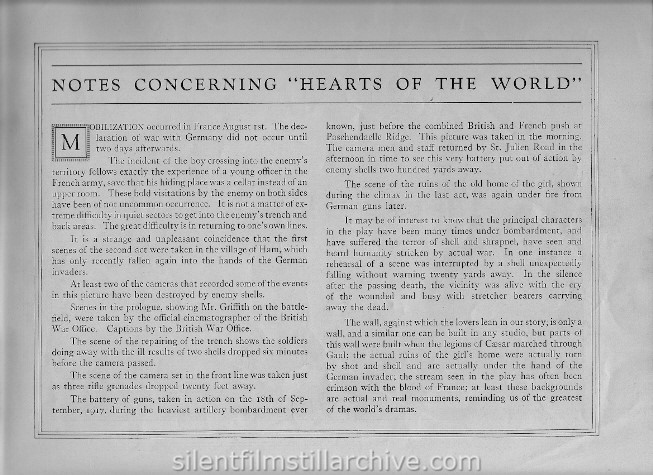
MOBILIZATION occurred in France August 1st. The declaration of war with Germany did not occur until two days afterwards.
The incident of the boy crossing into the enemy's territory follows exactly the experience of a young officer in the French army, save that his hiding place was a cellar instead of an upper room. These bold visitations by the enemy on both sides have been of not uncommon occurrence. It is not a matter of extreme difficulty in quiet sectors to get into the enemy's trench and back areas. The great difficulty is in returning to one's own lines.
It is a strange and unpleasant coincidence that the first scenes of the second act were taken in the village of Ham, which has only recently fallen again into the hands of the German invaders.
At least two of the cameras that recorded some of the events in this picture have been destroyed by enemy shells.
Scenes in the prologue, showing Mr. Griffith on the battlefield, were taken by the official cinematographer of the British War office. Captions by the British War Office.
The scene of the repairing of the trench shows the soldiers doing away with the ill results of two shells dropped six minutes before the camera passed.
The scene of the camera set in the front line was taken just as three rifle grenades dropped twenty feet away.
The battery of guns, taken in action on the 18th of September, 1917 during the heaviest artillery bombardment ever know, just before the combined British and French push at Paschendaelle Ridge. This picture was taken in the morning. The camera men and staff returned by St. Julien Road in the afternoon in time to see this very battery put out of action by enemy shells two hundred yards away.
The scene of the ruins of the old home of the girl, shown during the climax in the last act, was again under fire from German guns later.
It may be of interest to know that the principal characters in the play have been many times under bombardment, and have suffered the terror of shell and shrapnel, have seen and heard humanity stricken by actual war. In one instance, a rehersal of a scene was interrupted by a shell unexpectedly falling without warning twenty yards away. In the silence after the passing death, the vicinity was alive with the cry of the wounded and busy with stretcher bearers carrying away the dead.
The wall, against which the lovers lean in our story, is only a wall, and a similar one can be built in any studio, but parts of this wall were built when the legions of Caesar marched through Gaul; the actual ruins of the girl's home were actually torn by shot and shell and are actually under the hand of the German invader; the stream seen in the play has often been crimson with the blood of France; at least these backgrounds are actual and real monuments, reminding us of the greatest of the world's dramas.
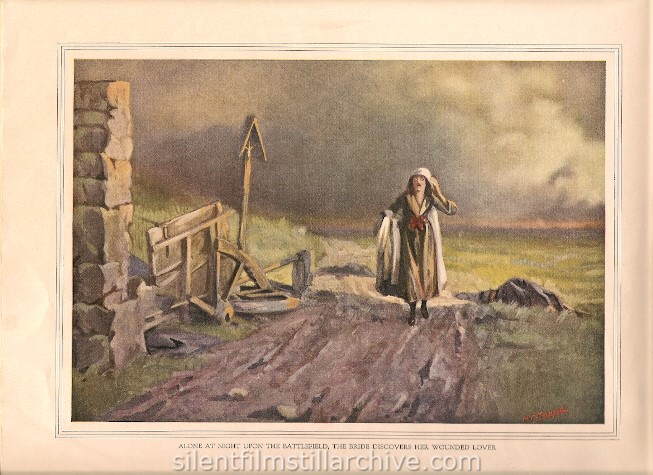
Alone at night upon the battlefield, the bride discovers her wounded lover.
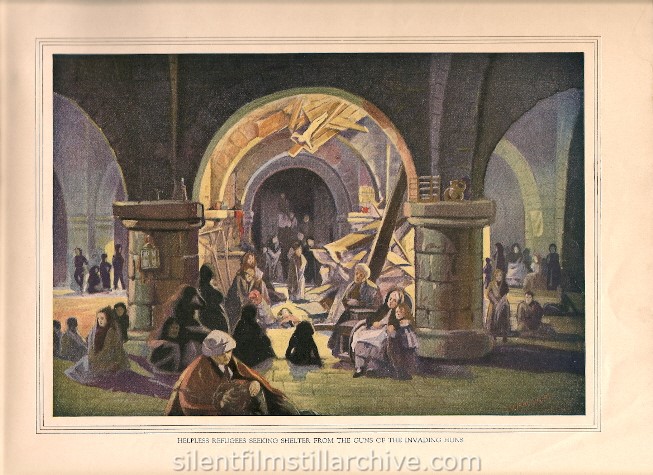
Helpless refugees seeking shelter from the guns of the invading Huns
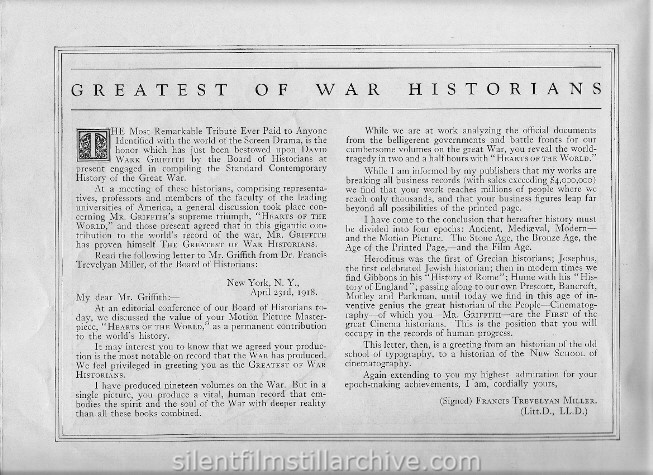
GREATEST OF WAR HISTORIANS
THE Most Remarkable Tribute Ever paid to anyone idendified with the world of the Screen Drama, is the honor which has just been bestowed upon DAVID WARK GRIFFITH by the Board of Historians at present engaged in compiling the Standard Contemporary History of the Great War.
At a meeting of these historians, comprising representatives, professors and members of the faculty of the leading universities of America, a general discussion took place concerning MR. GRIFFITH'S supreme triumph, "HEARTS OF THE WORLD," and those present agreed that in this gigantic contribution to the world's record of the war, MR. GRIFFITH has proven himself THE GREATEST OF WAR HISTORIANS.
Read the following letter to Mr. Griffith from Dr. Francis Trevelyan Miller, of the Board of Historians:
New York, N.Y.
April 23rd, 1918
My dear Mr. Griffith: --
At an editorial conference of our Board of Historians today, we discussed the value of your Motion Picture Masterpiece, "HEARTS OF THE WORLD," as a permanent contribution to the world's history.
It may interest you to know that we agreed your production is the most notable on record that the WAR has produced. We feel privileged in greeting you as the GREATEST OF WAR HISTORIANS.
I have produced nineteen volumes on the War. But in a single picture, you produce a vital, human record that embodies the spirit and the soul of the War with deeper reality than all these books combined.
While we are at work analyzing the official documents from the belligerent governments and battle fronts for our cumbersome volumes on the great War, you reveal the world-tragedy in two and a half hours with "HEARTS OF THE WORLD."
While I am informed by my publishers that my works are breaking all business records (with sales exceeding $4,000,000) we find that your work reaches millions of people where we reach only thousands, and that your business figures leap far beyond all possibilities of the printed page.
I have come to the conclusion that hereafter history must be divided into four epochs: Ancient, Mediaeval, Modern -- and the Motion Picture. The Stone Age, The Bronze Age, the Age of the Printed Page, -- and the Film Age.
Heroditus was the first of Grecian historians; Josephus, the first celebrated Jewish historian; then in modern times we find Gibbons in his "History of Rome"; Hume with his "History of England"; passing along to our own prescott, Bancroft, Motley and Parkman, until today we find in this age of inventive genius the great historian of the People -- Cinematography -- of which you -- MR. GRIFFITH -- are the FIRST of the great Cinema historians. This is the position that you will occupy in the records of human progress.
This letter, then, is a greeting from an historian of the old school of typography, to a historian of the NEW SCHOOL of cinematography.
Again extending to you my highest admiration for your epoch-making achievements, I am, cordially yours,
(Signed) FRANCIS TREVELYAN MILLER.
(Litt.D., LL.D)
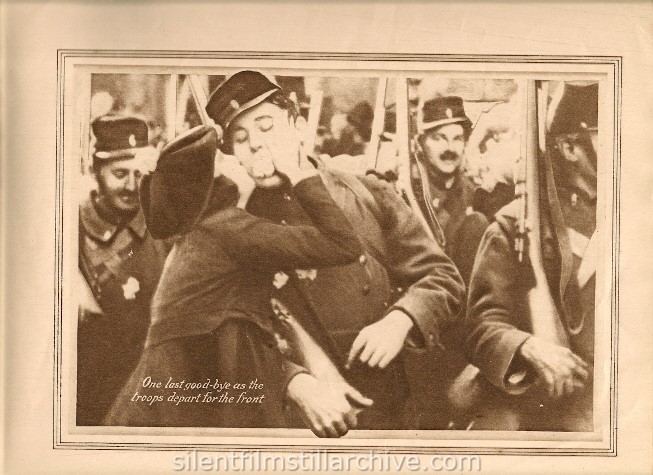
One last good-bye as the troops depart for the front.
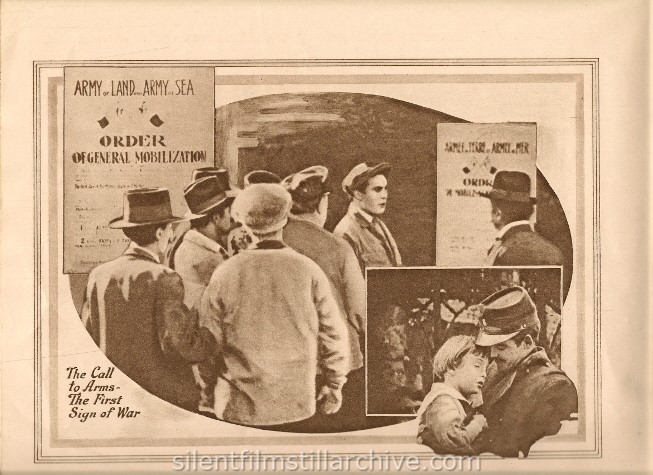
The Call to Arms -- The First Sign of War
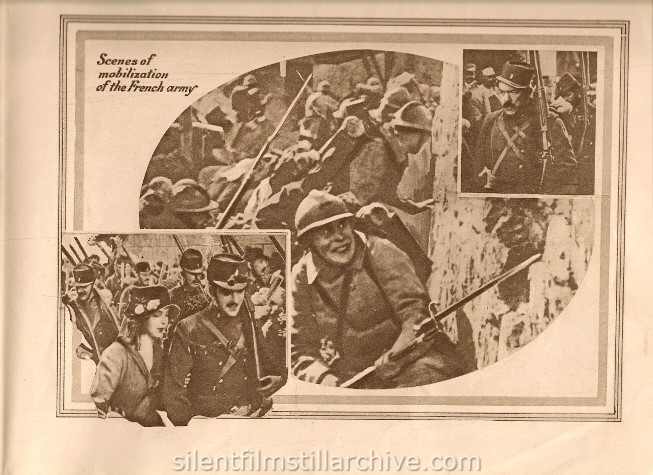
Scenes of mobilization of the French army
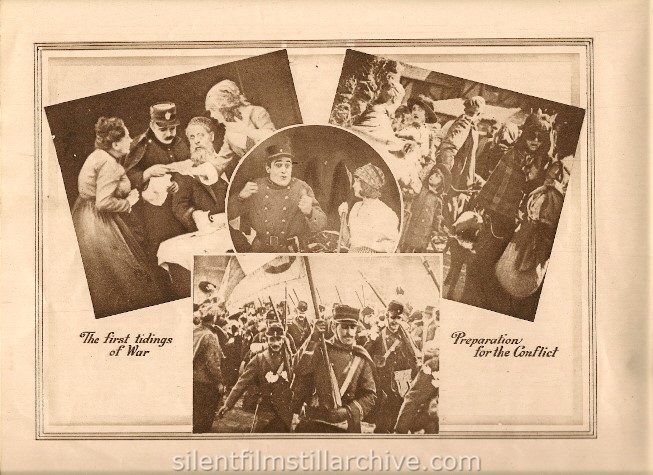
The first tidings of War
Preparation for the
Conflict
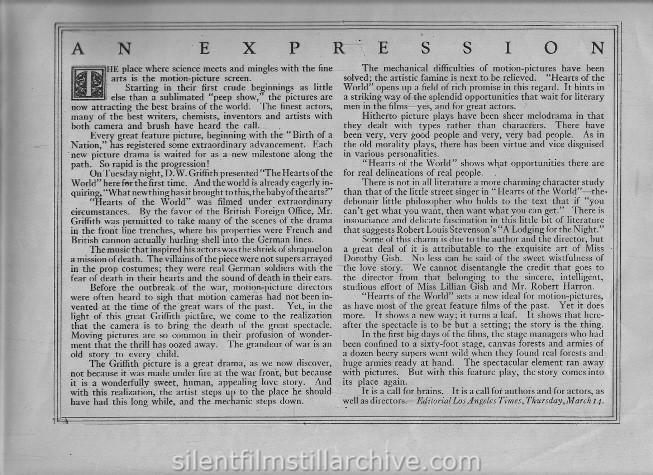
AN EXPRESSION
THE place where science meets and mingles with the fine arts is the motion-picture screen.
Starting in their first crude beginnings as little else than a sublimated "peep show," the pictures are now attracting the best brains of the world. The finest actors, many of the best writers, chemists, inventors and artists with both camera and brush have heard the call.
Every great feature picture, beginning with the "Birth of a Nation," has registered some extraordinary advancement. Each new picture drama is waited for as a new milestone along the path. So rapid is the progression!
On Tuesday night, D.W. Griffith presented "The Hearts of the World" here for the first time. And the world is already eagerly inquiring, "What new thing has it brought to this, the baby of the arts?"
"Hearts of the World" was filmed under extraordinary circumstances. By the favor of the British Foreign Office, Mr. Griffith was permitted to take many of the scenes of the drama in the front line trenches, where his properties were French and British cannon actually hurling shell into the German lines.
The music that inspired his actors was the shriek of shrapnel on a mission of death. The villains of the piece were not super arrayed in the prop costumes; they were real German soldiers with the fear of death in their hearts and the sound of death in their ears.
Before the outbreak of the war, motion picture directors were often heard to sigh that motion camera had not been invented at the time of the great wars of the past. Yet, in the light of this great Griffith picture, we come to the realization that the camera is to bring the death of the great spectacle. Moving pictures are so common in their profusion of wonderment that the thrill has oozed away. The grandeur of war is an old story to every child.
The Griffith picture is a great drama, as we now discover, not because it was made under fire at the war front, but because it is a wonderfully sweet, human, appealing love story. And with this realization, the artist steps up to the place he should have had this long while, and the mechanic steps down.
The mechanical difficulties of motion-pictures have been solved; the artistic famine is next to be relieved. "Hearts of the World" opens up a field of rich promise in this regard. It hints in a striking way of the splendid opportunities that wait for literacy men in the films - yes, and for great actors.
Hitherto picture plays have been sheer melodrama in that they dealt with types rather than characters. There have been very, very good people and very, very bad people. As in the old morality plays, there has been virtue and vice disguised in various personalities.
"Hearts of the World" shows what opportunities there are for real delineations of real people.
There is not in all literature a more charming character study than that of the little street singer in "Hearts of the World" - the debonair little philosopher who holds to the text that if "you can't get what you want, then want what you can get." There is insouciance and delicate fascination in this little bit of literature that suggests Robert Louis Stevenson's "A Lodging for the Night."
Some of this charm is due to the author and the director, but a great deal of it is attributable to the exquisite art of Miss Dorothy Gish. No less can be said of the sweet wistfulness of the love story. We cannot disentangle the credit that goes to the director from that belonging to the sincere, intelligent, studious effort of Miss Lillian Gish and Mr. Robert Harron.
"Hearts of the World" sets a new ideal for motion-pictures, as have most of the great feature films of the past. Yet it does more. It shows a new way; it turns a leaf. It shows that here-after the spectacle is to be but a setting; the story is the thing.
In the first big days of the films, the stage managers who had been confined to a sixty-foot stage, canvas forests and armies of a dozen beery supers went wild when they found real forests and huge armies ready at hand. The spectacular element ran away with pictures. But with this feature play, the story comes into its place again.
It is a call for brains. It is a call for authors and for actors, as well as directors. - Editorial Los Angeles Times, Thursday, March 14 (1918)
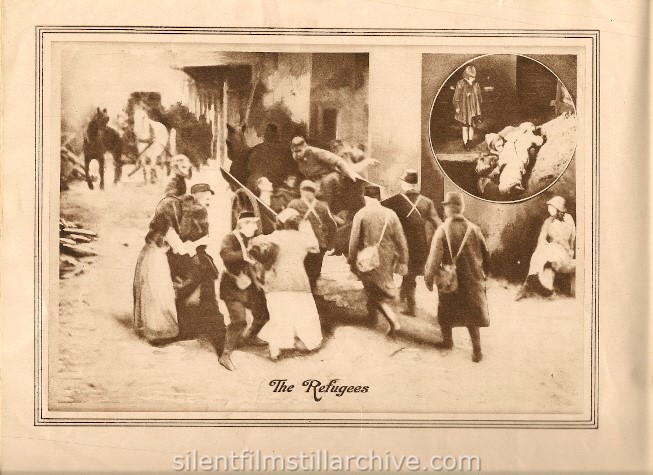
The Refugees
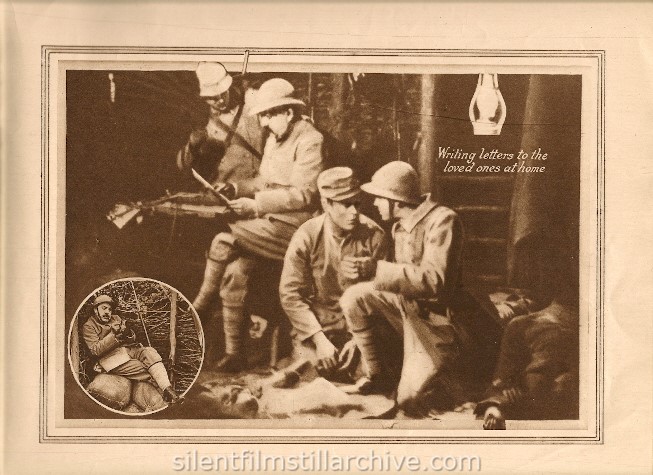
Writing letters to the loved ones at home
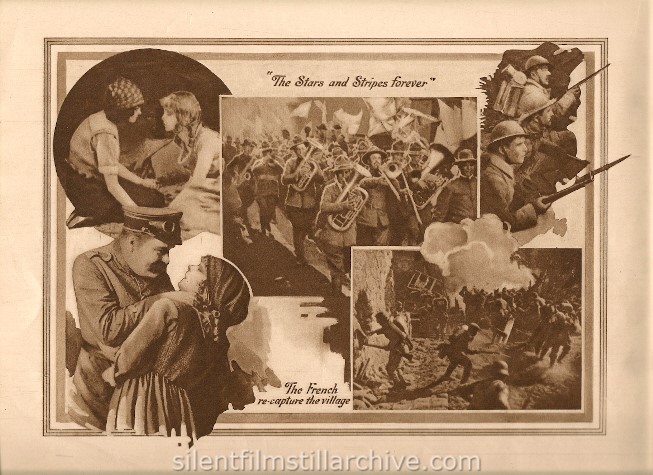
"The Stars and Stripes forever"
The French re-capture the village
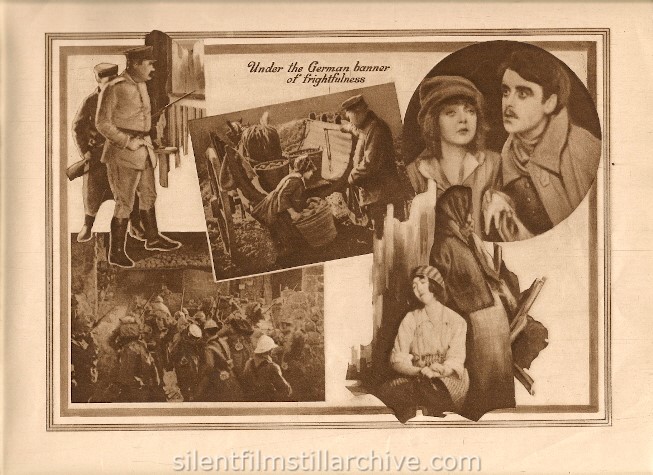
Under the German banner of frightfulness
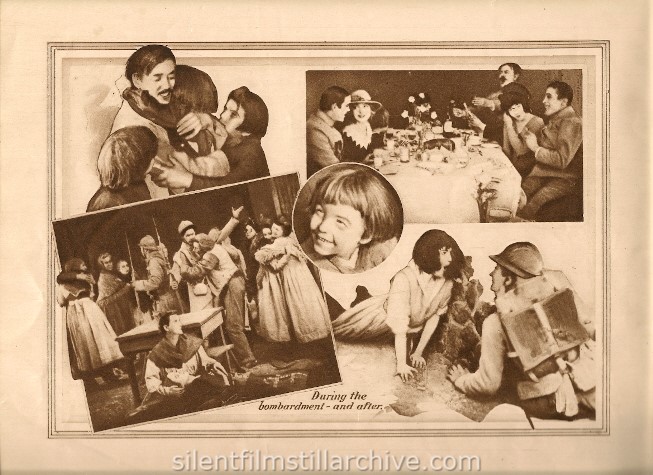
During the bombardment -- and after.
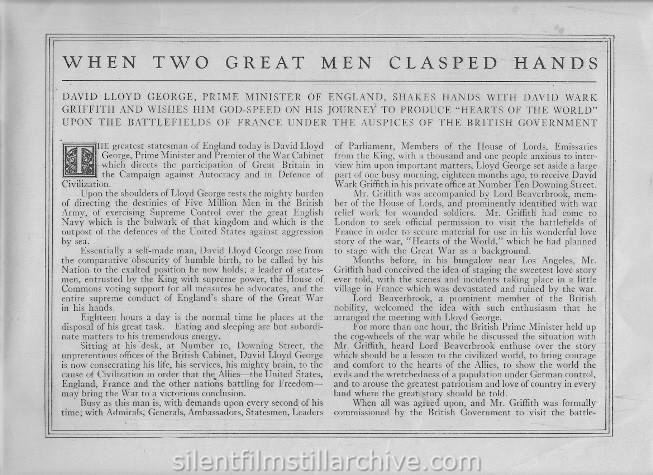
WHEN TWO GREAT MEN CLASPED HANDS
DAVID LLOYD GEORGE, PRIME MINISTER OF ENGLAND, SHAKES HANDS WITH DAVID WARK GRIFFITH AND WISHES HIM GOD-SPEED ON HIS JOURNEY TO PRODUCE "HEARTS OF THE WORLD" UPON THE BATTLEFIELDS OF FRANCE UNDER THE AUSPICES OF THE BRITISH GOVERNMENT
The greatest statesman of England today is David Lloyd George, Prime Minister and Premier of the War Cabinet which directs the participation of Great Britian in the Campaign against Autocracy and in Defence of Civilization.
Upon the shoulds of Lloyd George rests the might burden of directing the destinies of Five Million Men in the British Army, of exercising Supreme Control over the great English Navy which is the bulwark of that kingdom and wich is the ooutpost of the defences of the United States against aggression by sea.
Essentially a self-made man, David Lloyd George rose from the comparative obscurity of humble birth, to be called by his nation to the exalted position he now holds; a leader of statesmen, entrusted by the King with supreme power, the House of Commons voting support for all measures he advocates, and the entire supreme conduct of England's share of the Great War in his hands.
Eighteen hours a day is the normal time he places at the disposal of his great tast. Eating and sleeping are but subordinate matters to his tremendous energy.
Sitting at his desk at Number 10, Downing Street, the unpretentious offices of the British Cabinet, David Lloyd George is now consecrating his life, his services, his mighty brain, to the cause of Civilization in order that the Allies -- the United States, England, France and the other nations battling for Freedon -- may bring the War to a victorious conclusion.
Busy as this man is, with demands upon every second of his time, with Admirals, Generals, Ambassadors, Statesmen, Leaders of Parliament, Members of the House of Lords, Emmisaries from the King, with a thousand and one people anxious to interview him on important matters, Lloyd George set aside a large part of one busy morning, eighteen months ago, to receive David Wark Griffith in his private office at Number Ten Downing Street.
Mr. Griffith was accompanied by Lord Beaverbrook, member of the House of Lords, and prominently identified with war relief work for wounded soldiers. Mr. Griffith had come to London to seek official permission to visit the battlefields of France in order to secure material for use in his wonderful love story of the war, "Hearts of the World," which he had planned to stage with the Great War as a background.
Months before, in his bungalow near Los Angeles, Mr. Griffith had conceived the idea of staging the sweetest love story ever told, with the scenes and incidents taking place in a little village in France which was devastated and ruined by the war.
Lord Beaverbrook, a prominent member of the British nobility, welcomed the idea with such enthusiasm that he arranged the meeting with Lloyd George.
For more than one hour, the British Prime Minister held up the cog-wheels of the war while he discussed the situation with Mr. Griffith, heard Lord Beaverbrook enthuse over the story which should be a lesson to the civilized world, to bring courage and comfort to the hearts of the Allies, to show the world the evils and the wretchedness of a population under German control, and to arouse the greatest patriotism and love of country in every land where the great story should be told.
When all was agreed upon, and Mr. Griffith was formally commissioned by the British Government to visit the battlefields of France,
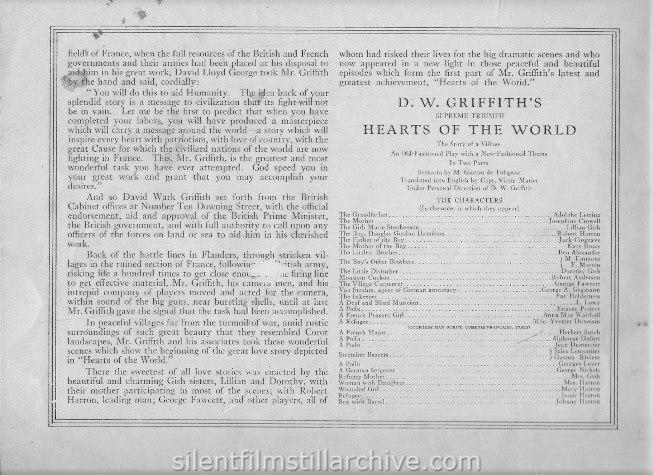
when the full resources of the British and French governments and their armies had been placed at his disposal to aid him to his great work, David Lloyd George took Mr. Griffith by the hand and said, cordially:
"You will do this to aid Humanity. The idea back of your splendid story is a message to civilization that its fight will not be in vain. Let me be the first to predict that when you have completed your labors, you will have produced a masterpiece which will carry a message around the world--a stor which will inspire every heart with patriotism, with love of country, with the great Cause for which the civilized nations of the world are now fighting in France. This, Mr. Griffith, is the greatest and most wonderful task you have ever attempted. God speed you in your great work and grant that you may accomplish your desires."
And so David Wark Griffith set forth from the British Cabinet offices at Number Ten Downing Street, with the official endorsement, aid and approval of the British Prime Minister, the British government, and with full authority to call upon any officers of the forces on land or sea to aid him in his cherished work.
Back of the battle lines in Flanders, through stricken villages in the ruined section of France, following the British army, resking life a hundred times to get close enough to the firing line to get effective material, Mr. Griffith, his camera men, and his inrepid company of players moved and acted for the camera, within sound of the big guns, near bursting shells, until at last Mr. Griffith gave the signal that the task had been accomplished.
In peaceful villages far from the turmoul of war, amid rustic surroundings of such great beauty that they resembled Corot landscapes, Mr. Griffith and his associates took these wonderful scenes which show the beginning of the great love story depicted in "Hearts of the World."
There the sweetest of all love stories was enacted by the beautiful and charming Gish sisters, Lillian and Dorothy, with their mother participating in most of the scenes; with Robert harron, leading man; George Fawcett, and other players, all of whom had risked their lives for the big dramatic scenes and who now appeared in a new light in those peaceful and beautiful episodes which form the first part of Mr. Griffith's latest and greatest achievement, "Hearts of the World."
D. W. GRIFFITH'S
SUPREME TRIUMPH
HEARTS OF THE
WORLD
The Story of a Village
An Old-Fashioned Play with a New-Fashioned
theme
In Two Parts
Scenario by M. Gaston de Tolignac
Translated into
English by Capt. Victor Marier
Under Person Direction of D. W.
Griffith
THE CHARACTERS
(In the order in which they appear)
|
The Grandfather |
Adolphe Lestina |
|
The Mother |
Josephine Crowell |
|
The Girl, Marie Stephenson |
Lillian Gish |
|
The Boy, Douglas Gordon Hamilton |
Robert Harron |
|
The Father of the Boy |
Jack Cosgrave |
|
The Mother of the Boy |
Kate Bruce |
|
The Littlest Brother |
Ben Alexander |
|
The Boy's Other Brothers |
M. (Marion) Emmons |
|
F. (Francis) Marion |
|
|
The Little Disturber |
Dorothy Gish |
|
Monsieur Cuckoo |
Robert Anderson |
|
The Village Carpenter |
George Fawcett |
|
Von Strohm, agent of German autocracy |
George A. Siegmann |
|
The Innkeeper |
Fay Holderness |
|
A Deaf and Blind Musician |
L. Lowry |
|
A Poilu |
Eugene Pouyet |
|
A French Peasant Girl |
Anna Mae Walthall |
|
A Refugee |
Mlle. Yvetter Duvoisin |
|
A French Major |
Herbert Sutch |
|
A Poilu |
Alphonse Dufort |
|
A Poilu |
Jean Dumercier |
|
Stretcher Bearers |
Jules Lemontier |
|
Gaston Riviere |
|
|
A Poilu |
Georges Loyer |
|
A German Sergeant |
George Nichols |
|
Refugee Mother |
Mrs. (Mary) Gish |
|
Woman with Daughter |
Mrs. Harron |
|
Wounded Girl |
Mary Harron |
|
Refugee |
Jessie Harron |
|
Boy with Barrel |
Johnny Harron |
with Lillian Gish, Dorothy Gish and Robert Harron. Directed by D. W. Griffith. Griffith/Paramount/Artcraft.
More Information on this film...

This work (Hearts of the World (1918),
by
Paramount/Artcraft), identified by
Bruce Calvert, is free of known
copyright restrictions.
Books
(none)
Last Modified February 18, 2012



















